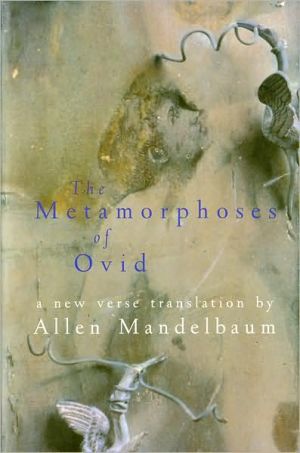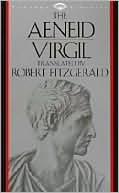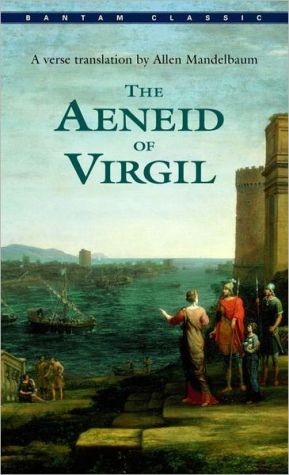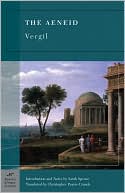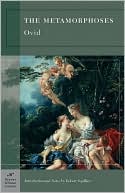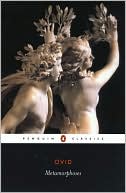The Metamorphoses of Ovid: A New Verse Translation (Mandelbaum translation)
Through Mandelbaum’s poetic artistry, this gloriously entertaining achievement of literature-classical myths filtered through the worldly and far from reverent sensibility of the Roman poet Ovid-is revealed anew. “[An] extraordinary translation...brilliant” (Booklist). With an Introduction by the Translator.\ \ \ This new translation reproduces in modern idiom the graceful, fluent style of one of the great poets of classical antiquity.\
Search in google:
Through Mandelbaum’s poetic artistry, this gloriously entertaining achievement of literature-classical myths filtered through the worldly and far from reverent sensibility of the Roman poet Ovid-is revealed anew. “[An] extraordinary translation...brilliant” (Booklist). With an Introduction by the Translator.BookListIt is staggering how literary developments of the era we call "postmodern" force us to read Ovid today with a familiarity missing, perhaps, for 2,000 years. Maybe that is why Christoph Ransmayr reframed the master's "Metamorphoses" a few years ago in his cunning, beautiful, and apocalyptic novel, "The Last World" (1990). At any rate, we can see now that the techniques of postmodernism have less to do with invention than with a nostalgia for faith and values in an age that forbids them: postmodernism is pretending irony when no irony is felt at all and hoping no one else feels the irony either. So it is that Ovid, in an age when a spot of atheism had begun to touch every thinking person's heart, decided to retell the myths of old. In such an atmosphere, plain telling of the ancient Greek myths would have made him seem a kindly buffoon, so by a series of devices, Ovid draws attention to the "act" of telling, switching abruptly from hymn to burlesque, forcing events to rhyme, enfolding tales within tales (even interrupting the teller), harping on motifs (like that of doubling), and in short, doing everything he can to let his audience say, "Didn't he tell that part well?"--and so believe and then unbelieve the moment the tale is over. And how could the respectable Augustine believe in these gods who rape, mock chastity, mock marriage, and bumble their way through disaster after disaster? Reading Mandelbaum's extraordinary translation, one imagines Ovid in his darkest moods with the heart of Baudelaire. Lines like these (much more circumspect in Humphries' famous translation) are brutal and black, particularly when they follow so hard on a passage of burlesque: "Then with a veil of heavy fog, the god / concealed a vast expanse of land; Jove stopped / her flight; he raped chaste Io." Mandelbaum's translation is brilliant. It throws off the stiff and mild homogeneity of former translations and exposes the vivid colors of mockery, laughter, and poison woven so beautifully by the master. Mandelbaum is not always the greatest poet, but he is the most extraordinary of translators, and this translation cannot be recommended more highly. We need Ovid. He is our brother. He is our face in the mirror.
Book I1Book II35Book III75Book IV107Book V143Book VI175Book VII207Book VIII245Book IX285Book X323Book XI357Book XII395Book XIII425Book XIV471Book XV511Afterword551
\ Stuart WhitwellIt is staggering how literary developments of the era we call "postmodern" force us to read Ovid today with a familiarity missing, perhaps, for 2,000 years. Maybe that is why Christoph Ransmayr reframed the master's "Metamorphoses" a few years ago in his cunning, beautiful, and apocalyptic novel, "The Last World" (1990). At any rate, we can see now that the techniques of postmodernism have less to do with invention than with a nostalgia for faith and values in an age that forbids them: postmodernism is pretending irony when no irony is felt at all and hoping no one else feels the irony either. So it is that Ovid, in an age when a spot of atheism had begun to touch every thinking person's heart, decided to retell the myths of old. In such an atmosphere, plain telling of the ancient Greek myths would have made him seem a kindly buffoon, so by a series of devices, Ovid draws attention to the "act" of telling, switching abruptly from hymn to burlesque, forcing events to rhyme, enfolding tales within tales (even interrupting the teller), harping on motifs (like that of doubling), and in short, doing everything he can to let his audience say, "Didn't he tell that part well?"--and so believe and then unbelieve the moment the tale is over. And how could the respectable Augustine believe in these gods who rape, mock chastity, mock marriage, and bumble their way through disaster after disaster? Reading Mandelbaum's extraordinary translation, one imagines Ovid in his darkest moods with the heart of Baudelaire. Lines like these (much more circumspect in Humphries' famous translation) are brutal and black, particularly when they follow so hard on a passage of burlesque: "Then with a veil of heavy fog, the god / concealed a vast expanse of land; Jove stopped / her flight; he raped chaste Io." Mandelbaum's translation is brilliant. It throws off the stiff and mild homogeneity of former translations and exposes the vivid colors of mockery, laughter, and poison woven so beautifully by the master. Mandelbaum is not always the greatest poet, but he is the most extraordinary of translators, and this translation cannot be recommended more highly. We need Ovid. He is our brother. He is our face in the mirror.\ \ \ \ \ Philadelphia InquirerThe best version of Ovid's Metamorphoses available in English today... It is readable, alive, at times slangy, and actually catches Ovid's tone.\ \ \ New York Review of BooksNo one can deny the merits of Slavitt's version. His English hexameter is a great success—a supple, fluid, and versatile medium that does Ovid's loosening of the Virgilian line full justice. And at his best he is very good indeed.\ — Bernard Knox\ \ \
